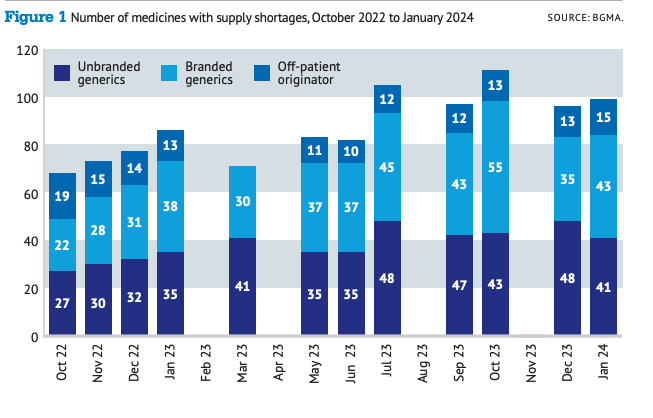Will VPAG help or hinder supply shortages?
In News
Follow this topic
Bookmark
Record learning outcomes
The UK has a new voluntary scheme that covers all branded medicines sold to the NHS. Leela Barham sets out what community pharmacies should know about the deal
We have a long history of voluntary deals struck between government and the pharmaceutical industry body, the ABPI. The latest version, running from 1 January 2024 to 31 December 2028, has evolved to differentiate rebates between older and newer medicines, as part of the goal of managing affordability. But could bigger rebates on older medicines make shortages of branded generics in community pharmacies worse?
Latest deal
Under the Voluntary Scheme for Branded Medicines Pricing, Access and Growth (VPAG), pharmaceutical companies need to pay rebates to the Department of Health and Social Care (DHSC) on most branded medicines sales to the NHS to stay within a spending cap. The deal is predicted to bring in £14 billion over five years. There are a host of promises to speed up the adoption of new treatments too, but money dominates the deal.
Branded medicines
Under VPAG, rebates from companies differ according to whether the branded medicine is ‘new’ or ‘old’.
Older medicines could have to pay back up to 35 per cent. The rate that applies depends on the degree of price erosion that has happened in the past. New medicines have a rebate that will change over time, depending upon branded medicines sales to the NHS. Higher rates on older medicines enable lower rates on new medicines, which the UK Government says makes the deal “pro-innovation and pro-competition”.
Warnings of shortages
The BGMA, representing manufacturers of branded generics as well as other generics companies, has warned that the new deal runs the risk of supply shortages. When the new deal headlines were set out last November, it said: “It will reduce the plurality of medicine suppliers for the NHS, increasing the drug shortage risk.”
The ABPI has also recognised VPAG’s potential impact on supply. “The industry is working with DHSC to monitor the impact of untested provisions agreed in VPAG, which in particular may impact the supply of older branded products,” it said in a February submission to the ongoing Health and Social Care Committee inquiry on pharmacy, adding: “Many in industry see a real risk that increasing numbers of medicines will no longer be economically viable to supply in the UK.”
More branded generics were in shortage in January 2024 than other treatments, according to tracking by the BGMA (Figure 1).
Community Pharmacy England told P3pharmacy it wouldn’t comment on the scheme directly, but Mike Dent, its director of pharmacy funding, has cited VPAG as part of the wider landscape of pricing of medicines in the UK. “In the way the procurement system works for community pharmacy, there is a relentless, downward pressure on real drug prices (so generics), but you see the brand prices come under pressure, effectively, with the VPAG and VPAS type systems. It feels like an addiction to cheap medicines, to me,” Dent told the pharmacy inquiry on 19 February.
Dent also pointed out that “the hidden costs of shortages are absolutely huge”.
A little help from VPAG
VPAG set out a promise of a funding pot of £75 million that will be allocated to medicines manufacturing. Mark Samuels, CEO of the BGMA, told the pharmacy inquiry he wants that not to focus just on new plant and technology but to help with supply issues. The BGMA has called for the Government to ensure that reimbursement to community pharmacies really does cover the cost of the medicine and the pharmacy margin, to help reduce the impact of shortages.
Dent called for a review of the supply chain in his comments to the pharmacy inquiry. There may also be help from VPAG through exceptions when there are supply issues. Dr Rick Greville, an ABPI director with responsibilities for the distribution and supply chain, told the committee that “exemptions can be raised if need be. If some medicines are found to be unviable under the current VPAG, there are arrangements by which those can be reconsidered”. De-branding may also happen too, according to Greville.
Time will tell if VPAG helps or hinders supply issues. It is, after all, still “untested”– just as Greville pointed out to MPs.


